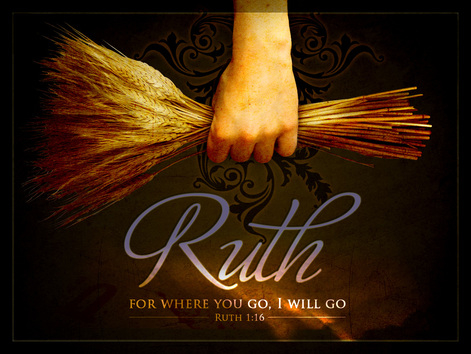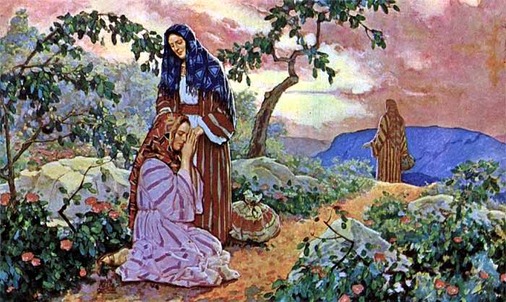The Book of Ruth

Ruth was the great-grandmother of David and an ancestress of Jesus (Matthew 1:1,5) The story is set in the time of the judges and reflects a temporary time of peace between Israel and Moab. It gives a series of intimate glances into the private lives of the members of an Israelite family and presents a delightful account of a remnant of true faith and piety during this period. The author is unknown. Redemption is a key concept throughout the book; the Hebrew word in its various forms occurs twenty-three times. The word shoes how God is working out His plan for salvation. The book of Ruth also illustrates love and devotion-self-giving love that fulfills God's law, and God's love in blessing the lives of His children.

In chapter 1, Ruth remains loyal to her mother-in-law Naomi after the death of her husband and in-laws. Naomi decides to return to her home land of Bethlehem alone, however, Ruth insists on staying with her and adopting Naomi’s God as her own. But Ruth said, "Do not urge me to leave you or turn back from following you; for where you go, I will go, and where you lodge, I will lodge. Your people shall be my people, and your God, my God” (1:16).
In chapter 2, we see Ruth gleaning in the fields of Naomi’s relative Boaz. Boaz out of compassion and obedience to the law allows Ruth to glean but also leaves extra grain for her purposely.
In chapter 3, Naomi encourages Ruth to seek marriage with Boaz as a
kinsman-redeemer. Ruth obeys Naomi and asks for her rights and Boaz agrees but mentions that he must first be sure there are no others with first rights.
In chapter 4, Boaz and Ruth are married and Ruth conceives a son named Obed, the grandfather of the great King David, in the lineage of Christ our Messiah.
Foreshadowing of Jesus
There was a famine in the land and a young man named Elimelech (The
Strength of the King) left Bethlehem (Celebrated or Praised) in Judah (Worship) and went to Moab (Incest) with his wife Naomi (the Beautiful Grace of God) and their two sons Mahlon (Sickly) and Chilion (Failing). Ruth 1:1-2
Apart from God, man's soul –represented by Naomi– can only have a
relationship with his own fallen, sin nature: Elimelech. The products of that relationship can be nothing better than sickly and failing. What else could there be when man does not have a personal relationship with God? That's because apart from God, man can do nothing.
The marriages of Mahlon (Sickly) and Chilion (Failing) to Orpah
(Stubbornness) and Ruth (Friendship) produced no children (Ruth 1:3-5).
The two options that man has for a relationship with God are: accept His
friendship through His Son or reject Him through stubbornness (pride).
In this case, the human spirit –Ruth– desires a fulfilled relationship with
God, but it can't be fruitful as long as it's based on human abilities.
Elimelech and his sons came to an end and died in Moab (Ruth 1:3-5).
Like Elimelech, man will die in his sins if he does not choose Jesus as his
savior. However, this picture is of a person's human-sinful nature (the flesh) dying along with its pitiful attempts to please God. In Colossians 2:11-14, Paul says, "and in Him you were also circumcised with a circumcision made without hands, in the removal of the body of the felsh by the circumcision of Christ...made you alive together with Him, having forgiven us all our transgressions..."
In Galatians 2:20, Paul states, "I have been crucified with Christ; and it is no longer I who live, but Christ lives in me; and the life which I now live in the flesh I live by faith in the Son of God, who loved me and gave Himself for me. I do not nullify the grace of God, for if righteousness comes through the Law, then Christ died needlessly."
Apart from Judah, Naomi (Grace) faded into a mere shell of outward beauty; she became Mara (Bitterness) (Ruth 1:6-7, Ruth 1:19-20).
This certainly shows what happens to man when he recognizes his condition without God. Although the outside may appear to be fulfilled, emptiness lies deep within his heart. That emptiness was intended to only be filled by Jesus Christ.
Naomi resolved that nothing good could ever come of her and gave up her
daughters-in-law Orpah (Stubbornness) and Ruth (Friendship) (Ruth 1:6-9).
When man recognizes his condition –dead in his sins– it is then that he
realizes that there is nothing in him of any value: not his possessions, nor his power, not even his prestige– nothing of the flesh of this world has true and lasting value.
In desperation, Naomi resolved to return to Judah alone, but Ruth
(Friendship) would not leave her (Ruth 1:10-18).
Ruth's entry into Judah touched Boaz (the true and final Strong Redeemer or Pillar). He gladly paid the price to adopt them into his own household (Ruth 4:7-15).
When man's spirit seeks a relationship with our Redeemer –Jesus– a wonderful thing happens: He finds that the price to be free from sin and death (the wages of sin) have been paid.
Naomi and Ruth were downtrodden and empty-handed when they came to Judah, but the Redeemer met all their needs and loved them as they were (Ruth 2, Ruth 3).
When a man comes to Jesus weary and heavy-burdened, Jesus takes those burdens upon Himself so that the man might experience the peace and contentment that only Jesus is able to provide. In Matthew 11:28, Jesus says, "Come to Me, all who are weary and heavy-laden, and I will give you rest." and in verse 30, "For My yoke is easy and My burden is light."
Naomi (the Beautiful Grace of God) was restored to be as she was intended to be –leaving her bitterness behind. Soon, the Redeemer joined Ruth to produce a child named Obed (a Servant) (Ruth 4:16-17).
The joining together of Jesus and the human spirit restores man to the state he was created for: a state of unity with God through His beloved Son. That new creation is intended to be one who serves others in love.
(2 Corinthians 5:17)
Obed fulfilled the hope of Naomi by producing David (a Beloved Son) (Ruth 4:16-22). Jesus the Messiah is the son of David (Matthew 1:1).
Jesus is about a relationship. When we turn to Him and rest in the union as a new creation, God will work through us and His perfect will permeates our entire being. Amen!
In chapter 2, we see Ruth gleaning in the fields of Naomi’s relative Boaz. Boaz out of compassion and obedience to the law allows Ruth to glean but also leaves extra grain for her purposely.
In chapter 3, Naomi encourages Ruth to seek marriage with Boaz as a
kinsman-redeemer. Ruth obeys Naomi and asks for her rights and Boaz agrees but mentions that he must first be sure there are no others with first rights.
In chapter 4, Boaz and Ruth are married and Ruth conceives a son named Obed, the grandfather of the great King David, in the lineage of Christ our Messiah.
Foreshadowing of Jesus
There was a famine in the land and a young man named Elimelech (The
Strength of the King) left Bethlehem (Celebrated or Praised) in Judah (Worship) and went to Moab (Incest) with his wife Naomi (the Beautiful Grace of God) and their two sons Mahlon (Sickly) and Chilion (Failing). Ruth 1:1-2
Apart from God, man's soul –represented by Naomi– can only have a
relationship with his own fallen, sin nature: Elimelech. The products of that relationship can be nothing better than sickly and failing. What else could there be when man does not have a personal relationship with God? That's because apart from God, man can do nothing.
The marriages of Mahlon (Sickly) and Chilion (Failing) to Orpah
(Stubbornness) and Ruth (Friendship) produced no children (Ruth 1:3-5).
The two options that man has for a relationship with God are: accept His
friendship through His Son or reject Him through stubbornness (pride).
In this case, the human spirit –Ruth– desires a fulfilled relationship with
God, but it can't be fruitful as long as it's based on human abilities.
Elimelech and his sons came to an end and died in Moab (Ruth 1:3-5).
Like Elimelech, man will die in his sins if he does not choose Jesus as his
savior. However, this picture is of a person's human-sinful nature (the flesh) dying along with its pitiful attempts to please God. In Colossians 2:11-14, Paul says, "and in Him you were also circumcised with a circumcision made without hands, in the removal of the body of the felsh by the circumcision of Christ...made you alive together with Him, having forgiven us all our transgressions..."
In Galatians 2:20, Paul states, "I have been crucified with Christ; and it is no longer I who live, but Christ lives in me; and the life which I now live in the flesh I live by faith in the Son of God, who loved me and gave Himself for me. I do not nullify the grace of God, for if righteousness comes through the Law, then Christ died needlessly."
Apart from Judah, Naomi (Grace) faded into a mere shell of outward beauty; she became Mara (Bitterness) (Ruth 1:6-7, Ruth 1:19-20).
This certainly shows what happens to man when he recognizes his condition without God. Although the outside may appear to be fulfilled, emptiness lies deep within his heart. That emptiness was intended to only be filled by Jesus Christ.
Naomi resolved that nothing good could ever come of her and gave up her
daughters-in-law Orpah (Stubbornness) and Ruth (Friendship) (Ruth 1:6-9).
When man recognizes his condition –dead in his sins– it is then that he
realizes that there is nothing in him of any value: not his possessions, nor his power, not even his prestige– nothing of the flesh of this world has true and lasting value.
In desperation, Naomi resolved to return to Judah alone, but Ruth
(Friendship) would not leave her (Ruth 1:10-18).
Ruth's entry into Judah touched Boaz (the true and final Strong Redeemer or Pillar). He gladly paid the price to adopt them into his own household (Ruth 4:7-15).
When man's spirit seeks a relationship with our Redeemer –Jesus– a wonderful thing happens: He finds that the price to be free from sin and death (the wages of sin) have been paid.
Naomi and Ruth were downtrodden and empty-handed when they came to Judah, but the Redeemer met all their needs and loved them as they were (Ruth 2, Ruth 3).
When a man comes to Jesus weary and heavy-burdened, Jesus takes those burdens upon Himself so that the man might experience the peace and contentment that only Jesus is able to provide. In Matthew 11:28, Jesus says, "Come to Me, all who are weary and heavy-laden, and I will give you rest." and in verse 30, "For My yoke is easy and My burden is light."
Naomi (the Beautiful Grace of God) was restored to be as she was intended to be –leaving her bitterness behind. Soon, the Redeemer joined Ruth to produce a child named Obed (a Servant) (Ruth 4:16-17).
The joining together of Jesus and the human spirit restores man to the state he was created for: a state of unity with God through His beloved Son. That new creation is intended to be one who serves others in love.
(2 Corinthians 5:17)
Obed fulfilled the hope of Naomi by producing David (a Beloved Son) (Ruth 4:16-22). Jesus the Messiah is the son of David (Matthew 1:1).
Jesus is about a relationship. When we turn to Him and rest in the union as a new creation, God will work through us and His perfect will permeates our entire being. Amen!
continue to 1 Samuel...